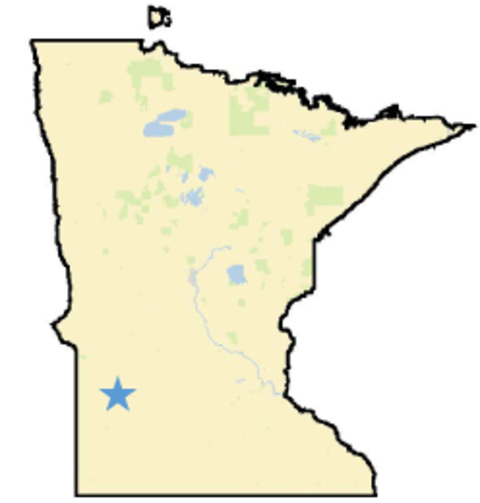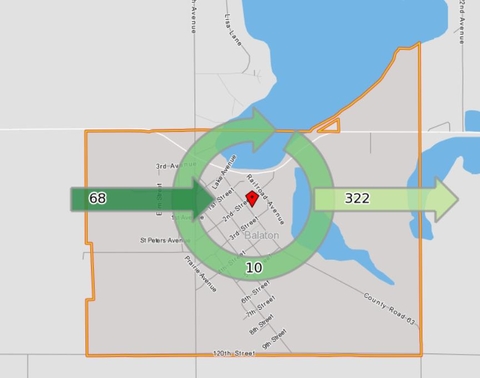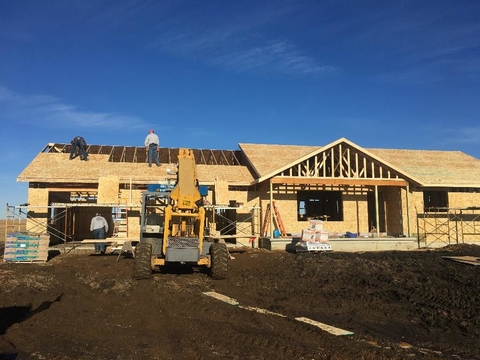Active EDA builds infrastructure and markets town’s quality of life
Core housing issues addressed
- Housing stock and affordability
- Housing finance
Housing challenges
As a small town (population 628) with limited and aging housing stock, Balaton is focused on supplying quality housing so that the town meets the needs of new families and retains retirement-age residents.
The Balaton Economic Development Authority (EDA) has taken an active role in developing housing, as well as partnering in the financing of new housing units. Robust business development in nearby Marshall and Balaton itself makes the issue more critical. Balaton’s holistic approach to economic development and selling the community’s amenities has spurred both private and public efforts.
Community profile
A large portion of the city’s residents leave Balaton to work in other communities, especially nearby Marshall (pop. 13,710), which is the regional center just 15 miles away. According to On the Map data from the U.S. Census Bureau that tracks locations of workers’ residences and places of employment, 322 residents travel outside Balaton for work, whereas only 68 enter the community for employment (Figure 3). According to the U.S. Census Bureau, the city has retained its population since 2010, standing now at 628. This number is down from 643 in 2010. This trend is in contrast to other small communities in Southwest Minnesota that have seen steeper declines during this same time period. Compared to the state, the city has a greater portion of residents over the age of 65. In 2010, 19 percent of its residents were over 65, compared to 13 percent in Minnesota.
Tara Onken, executive director of Balaton’s EDA, said the city is focusing on housing, in part, to retain seniors who would otherwise leave the community and to offer small-town living to aging farm couples transitioning off-farm.
The agriculture and agri-business related industries play a significant role in the local economy. Balaton is home and headquarters to trū Shrimp Company, a pioneer in the shrimp industry. They take a sustainable and environmentally responsible approach to raising a safe, natural, and abundant global food supply with innovative technology. Their founding company, Ralco, is also a Balaton-based company with global ties in the plant and animal health industry. The city’s proximity to Marshall also helps support and sustain its development, as well as the development of other small communities nearby.
Housing success story
Balaton and its EDA have initiated multiple activities to increase housing in the community. The EDA’s current thrust is marketing the whole community and its amenities while conducting traditional housing development activities, such as building a spec house and providing tax incentives.
The city and its EDA recently made significant investments in community infrastructure, including child care (slated to open in September 2018), natural gas ($5 million+ project done in 2017-18), and fiber broadband to every home ($1.5 million project). The community also built a multigenerational park in its expanding Eastbay housing development. A $10,000 donation from Minnesota Energy Partners — the regional utility that also invested in Balaton’s natural gas expansion — and substantial volunteer time brought the idea to fruition. They actively promoted these amenities through radio, newspaper advertising, and brochures in the region to attract residents and position the city as a great place to live.
Project partnerships
Balaton’s EDA has taken a multi-prong approach to housing development:
- The city started a tax abatement program to support lot purchase and development. This spurred numerous private investments, including a beautiful twin home and numerous single-family homes that significantly increased taxable property within the municipality. Currently, lot prices are each $15,000.
- In partnership with a local Ace Hardware of Marshall, the city built a spec house. Ace Hardware covered the cost of construction and holds ownership until sold. The EDA is sharing in the risk by transferring the lot at closing for a nominal cost, deferring the balance of the purchase price until the home sells. The EDA also agreed to drop the price of the lot $500 each month until the spec home sells to help encourage sale of the house.
- The city developed a subdivision 15 years ago and sells the lots. Since the end of the Great Recession, Balaton has sold more than 30 of the 70 lots the city developed 15 years ago. These developments have significantly increased the city tax base.
- The city sold city-owned properties to private investors. The EDA had previously owned a 4-plex and a duplex, but sold them to the private market within the past 18 months. This move put the properties on the tax rolls and freed up some working capital for future EDA projects.
Programs and financial resources
The Balaton EDA and City of Balaton have implemented a tax abatement incentive program as a primary financial incentive to spur new development. The city abates its portion of taxes over three years at 80 percent, 60 percent, and 40 percent, respectively, before going fully on the tax rolls in year four. Lyon County recently implemented a tax abatement incentive program as well, which will also impact new development in Balaton.
Who can you follow up with to learn more or to clarify housing project details?
Tara Onken, economic development director, Balaton EDA
Phone: 507-820-1710 | Email address: tara_onken14@hotmail.com
- Interview with Tara Onken, 2018.
- Minnesota Demographic Center, City Population Estimates, 2017.
- Census Bureau, On the Map, 2017.
- Greater Minnesota Housing Fund, “Building it in Balaton,” Dec. 9, 2017.
About the MN Rural Housing study
Small rural communities in Minnesota face persistent housing challenges. In 2017, the state’s regional development organizations (RDOs) identified housing as a top learning focus and called for the creation of case studies that highlight creative solutions to persistent housing issues confronting our smaller communities. This project is a collaboration between the Extension Department of Community Development and the Center for Small Towns.
Reviewed in 2018





